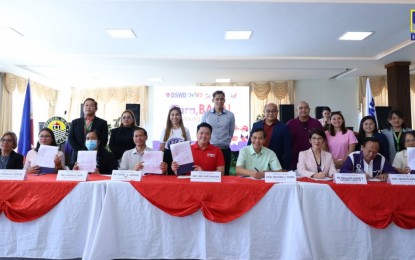
‘TARA BASA!’ GOES TO CEBU. Social Welfare Secretary Rex Gatchalian (center) and key partners sign a memorandum of agreement for the implementation of the “Tara Basa!” tutoring program in Cebu City, in a ceremony held at the Cebu City Hall on Friday (March 8, 2024). The program will benefit struggling and non-reading elementary students, their parents, and college students from state colleges and universities. (Photo courtesy of DSWD)
MANILA – Department of Social Welfare and Development (DSWD) Secretary Rex Gatchalian on Friday signed a memorandum of agreement (MOA) with Cebu City Mayor Michael Rama and the State Universities and Colleges (SUC) represented by Cebu Normal University president Dr. Daniel Ariaso Sr., launching the implementation of the “Tara Basa!” tutoring program in Cebu City.
“We are very, very, happy to bring ‘Tara, Basa!’ to cities outside Metro Manila,” Gatchalian said during the kick-off activity at the Cebu City Hall.
“The President (Ferdinand R. Marcos Jr.) instructed us to transform the department from purely social welfare to developmental because, through development, we can pull our people out of poverty. Yes, social welfare is important, but social welfare, as we know, is temporary. Developmental programs, like ‘Tara, Basa!’, are long-term and institutionalized,” he said in his speech.
The program’s expansion is a result of its successful pilot test in the National Capital Region (NCR) from August to November last year, which, according to the DSWD chief, is a way for the department “to incorporate education into social welfare” that will uplift the conditions of the agency’s clientele.
Gatchalian noted that “Tara Basa!” has assisted struggling and non-reader elementary students with the “20-day after-school reading sessions” component.
He also cited the significance of the program for college students from SUCs who need support for their studies.
“With this program, we extend to them the education assistance that they expect from the department. So that's the social welfare side,” Gatchalian pointed out.
He likewise thanked the key partners for their commitment to ensuring the program’s success and effective implementation.
“I think the greatest thing that we can do together as a whole-of-nation approach is helping our children out of darkness, out of the illiteracy sphere that they are in. With reading, we can uplift the lives of our children out of poverty. But at the same time, we're making something great happen,” he said.
Program expansion
Aside from Cebu City, the “Tara, Basa!” program will also be implemented in Malolos City and San Jose del Monte City in Bulacan province; Quezon; Western Samar; Taraka and Marawi Cities in Lanao del Sur; and General Santos City. It will also continue to be implemented in the NCR.
The program’s expansion aims to benefit more than 180,700 beneficiaries, which include grade school learners, parents, tutors, and youth development workers (YDWs) from the target expansion areas.
Under the program, struggling and non-reading elementary students are given learning and reading sessions by tutors while their parents and guardians are given Nanay-Tatay learning sessions by YDWs.
The parents and guardians of the children-beneficiaries are provided with cash-for-work (CFW) by the DSWD for attending the Nanay-Tatay sessions, and for assisting their children in preparing their needs for learning and reading and in their after-reading assignments.
In exchange for their service in conducting learning and reading sessions, the tutors and YDWs, who are college students enrolled in SUCs, are provided with educational support through the CFW mechanism. (PNA)
